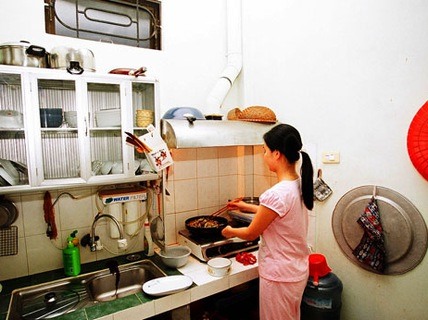

The country has required a legal labour contract between the employers and their domestic workers since 2014. Three years later, implementation of the labour contract law has fallen far short of hopes, as many workers still lack contracts and are vulnerable to abuse and mistreatment.
 |
| Up to 90 per cent of domestic helpers in Việt Nam report not having a legal contract with the families they worked for. — Photo nld.vn |
HÀ NỘI — The country has required a legal labour contract between the employers and their domestic workers since 2014. Three years later, implementation of the labour contract law has fallen far short of hopes, as many workers still lack contracts and are vulnerable to abuse and mistreatment.
Up to 90 per cent of domestic helpers in Việt
Hoàng Thị Sửu’s hometown is in
“My monthly salary is VNĐ5 million (US$220). It helps to cover my children’s study costs,” Sửu said.
Sửu did not have a legal labour contract with her family employer. Her salary and bonus for Tết (Lunar New Year) holiday were set in a verbal agreement prior to or during her working time at the house. The middle-aged woman had neither health nor social insurances.
The rising living standard of middle-class families in big cities has led to a rocketing in demand for domestic helpers over the last decade, which is unlikely to slow down in the near future. The great demand has drawn an influx of women from their rural hometowns to cities like
According to the Ministry of Labour, Invalids and Social Affairs, Việt
Up to 75 per cent of migrant worker women choose domestic worker as their job.
Their daily work could range from taking care of the elderly and children in the family to cleaning and cooking. They may live with their employers or work on an hourly basis.
Nguyễn Thị Mai is a veteran domestic worker in Hà Nội. It has been seven years since the middle-aged woman left her rural hometown of Thanh Chương in the north-central
The non-governmental organisation Research Centre for Gender, Family and Community Director Ngô Thị Ngọc Anh said that only three per cent of domestic helpers have social insurance. Most of them did not join the insurance during their time as domestic helpers but while they were working at their previous jobs.
The reason for the lack of labour contracts among domestic workers was not hard to figure out, Anh said.
A majority of domestic workers have low levels of education, she said, and few of them are familiar with the laws and regulations regarding labour rights.
A 2014 governmental decree states that the domestic workers and their employers must establish a labour contract including agreements on salary, bonus or overtime payment, among other issues.
Tống Thị Minh, Director of the Department of Labour Relations and Wages under the Ministry of Labour, Invalids and Social Affairs, said that the labour contract matter was currently deemed a nuisance by both sides.
“Most of them think that it (domestic help) is a simple job and a labour contract will be unnecessary,” Minh said.
Regulations also require that young domestic workers aged from 15 to 18 must have a legal representative, or a guardian, to sign a contract with the employers. Its administrative procedure is thought to be complicated and so both employers and employees often dismiss it, Minh said.
Another key reason comes from the domestic workers themselves. They just do not want to spend their already meagre income on the insurances.
“If I join social insurance, my wage will be cut. My daily life is already hard enough and I need all the money I have,” Sửu said. — VNS









